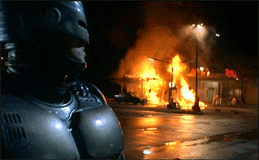|
Newest Reviews:
New Movies -
The Tunnel
V/H/S
The Tall Man
Mama Africa
Detention
Brake
Ted
Tomboy
Brownian Movement
Last Ride
[Rec]³: Genesis
Hara-Kiri: Death of a Samurai
Indie Game: The Movie
Abraham Lincoln: Vampire Hunter
Old Movies -
Touki Bouki: The Journey of the Hyena
Drums Along the Mohawk
The Chase
The Heiress
Show
People
The Strange Affair of Uncle Harry
Pitfall
Driftwood
Miracle Mile
The Great Flamarion
Dark Habits
Archives -
Recap: 2000,
2001, 2002,
2003, 2004
, 2005, 2006,
2007 , 2008
, 2009 ,
2010 , 2011 ,
2012
All reviews alphabetically
All reviews by star rating
All reviews by release year
Masterpieces
Screening Log
Links
FAQ
E-mail me
HOME
| |
RoboCop (Paul Verhoeven) 1987
 I never know quite how to approach a Paul Verhoeven movie,
but I certainly don’t take the moral high road of some critics that reject his
films outright as exploitative trash. I found plenty to like even in his
perpetually lambasted, and criminally misunderstood Showgirls. There’s usually a level of satire present in his work:
the question is usually whether or not we’re supposed to be laughing at
what’s on screen. RoboCop, his first
American feature, doesn’t vary much from his body of work in that respect.
It’s an exceptionally gory and violent film (especially in the X rated cut),
but somehow the more violence that the director shows, the less real it becomes.
When its characters are pulverized to this degree, they stop functioning as
characters, and become some sort of cartoon. The movie plays closer to a comic
book than anything, although it seems to be a comic book that is read by someone
who’s old enough to realize its inadequacies and contradictions, yet enjoy it
anyway. If almost every scene didn’t work, I would be tempted to call it
overblown. Because it’s so obvious that nothing is really real here (though
it’s always played with a straight face – except for a few intrusive
mock-commercials), the director is freed to send up legitimate social concerns,
or at least those that existed in the mid-eighties (gentrification,
commercialization, etc…). Somehow though, RoboCop
avoids becoming kitschy irony, and that keeps it from feeling cynical.
I never know quite how to approach a Paul Verhoeven movie,
but I certainly don’t take the moral high road of some critics that reject his
films outright as exploitative trash. I found plenty to like even in his
perpetually lambasted, and criminally misunderstood Showgirls. There’s usually a level of satire present in his work:
the question is usually whether or not we’re supposed to be laughing at
what’s on screen. RoboCop, his first
American feature, doesn’t vary much from his body of work in that respect.
It’s an exceptionally gory and violent film (especially in the X rated cut),
but somehow the more violence that the director shows, the less real it becomes.
When its characters are pulverized to this degree, they stop functioning as
characters, and become some sort of cartoon. The movie plays closer to a comic
book than anything, although it seems to be a comic book that is read by someone
who’s old enough to realize its inadequacies and contradictions, yet enjoy it
anyway. If almost every scene didn’t work, I would be tempted to call it
overblown. Because it’s so obvious that nothing is really real here (though
it’s always played with a straight face – except for a few intrusive
mock-commercials), the director is freed to send up legitimate social concerns,
or at least those that existed in the mid-eighties (gentrification,
commercialization, etc…). Somehow though, RoboCop
avoids becoming kitschy irony, and that keeps it from feeling cynical.
 The personality-deprived actors that Verhoeven chooses (Peter Weller and Nancy
Allen, among others) don’t seem to have enough presence to interfere with the
director’s vision. RoboCop’s
nightmarish, crime-ridden future is one where the American Dream is a farce. To
be employed by mass corporations is to sell yourself, your family life, and even
the rights to your body. Once Murphy (Weller), the rookie cop starts working, we
don’t see his family except in flashbacks. When he finally returns home,
they’ve already moved out. His transfiguration into RoboCop removes all
personality from him, but makes him a much more efficient worker. Murphy’s
post-resurrection quest for vengeance and justice feels a bit futile since
he’s already stuck in a body that isn’t his. If he stops the corporation
that put him there, he’ll still go on, fighting their crusade because of his
hard wiring. Because of the relative pointlessness of his fight, the film’s
gung-ho attitude seems downright sarcastic. The audience that cheers RoboCop
as he goes about his vendetta is forced to cheer lawless and brutal vigilantism.
Like all of Verhoeven’s work, the genre trappings in RoboCop
are simply an excuse to place the audience in a position where the director can
use moral dilemmas and graphic material to make them squirm.
The personality-deprived actors that Verhoeven chooses (Peter Weller and Nancy
Allen, among others) don’t seem to have enough presence to interfere with the
director’s vision. RoboCop’s
nightmarish, crime-ridden future is one where the American Dream is a farce. To
be employed by mass corporations is to sell yourself, your family life, and even
the rights to your body. Once Murphy (Weller), the rookie cop starts working, we
don’t see his family except in flashbacks. When he finally returns home,
they’ve already moved out. His transfiguration into RoboCop removes all
personality from him, but makes him a much more efficient worker. Murphy’s
post-resurrection quest for vengeance and justice feels a bit futile since
he’s already stuck in a body that isn’t his. If he stops the corporation
that put him there, he’ll still go on, fighting their crusade because of his
hard wiring. Because of the relative pointlessness of his fight, the film’s
gung-ho attitude seems downright sarcastic. The audience that cheers RoboCop
as he goes about his vendetta is forced to cheer lawless and brutal vigilantism.
Like all of Verhoeven’s work, the genre trappings in RoboCop
are simply an excuse to place the audience in a position where the director can
use moral dilemmas and graphic material to make them squirm.
* * * 1/2
03-11-02
Jeremy Heilman
|